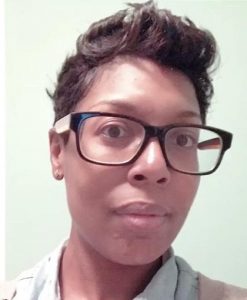by Ashley Williams

From copy editor to Director of the Center for Digital Scholarship at the University of Chicago, Stacie Williams has had an exciting career journey filled with achievements and accolades. Stacie graduated from the University of Wisconsin-Madison with a B.A in journalism in 2001. She has written for a number of prominent organizations including, the Chicago Reporter and Chicago Defender. Her writing interests include studies on race and social justice– topics she has published on and been awarded for.
Stacie eventually took a job at the Newberry Library in Chicago, inspiring her to apply to Simmons’ Archives Management program. She graduated with her M.A. in Library Science in 2011. As a library professional, she has served as the keynote speaker for multiple conferences geared toward digital librarianship and been elected chair of the Nominating Committee for the Society of American Archivists. She also volunteered to be a part of the team of archivists that worked on A People’s Archive of Police Violence in Cleveland.
Stacie’s journey back to Chicago, where she grew up, started with a desire to be closer to her parents. I asked her what about the position attracted her aside from family concerns. She informed me that since its founding in 1890, UChicago has been at the forefront of developing how we study social sciences– a range of studies that have always been close to her heart and research. The University is also located in the heart of urban Hyde Park, where Barack Obama lived while teaching for the University’s Law school for 12 years. This would allow Stacie to further her research and involvement in race and social justice by facilitating collaboration by facilitating collaboration with affording organizations like the Black Metropolitan Research Consortium.
Stacie’s primary responsibilities at UChicago include coordinating workshops and related services for data service librarians and being a consultant for data management options for faculty and staff. She also manages UChicago’s digital scholarship repository, Knowledge@Uchicago and is on the library’s digital collections working group. As Director, Stacie primarily serves the faculty of UChicago. She spends a great deal of her time helping faculty members decide how and where to preserve their data. Much of this is done in an effort to advocate for open access. This means that instead of selling their work to a journal that will charge the public for access, Stacie encourages faculty to add their scholarship to UChicago’s digital repository where it can be accessed for free. When asked who she could serve more, Stacie lamented that she wishes she could do more for UChicago’s undergraduate students. She also noted that graduate students are often more open to ideas like open access than senior faculty might be and furthermore are creating the scholarship of tomorrow.
Stacie also supports and promotes several outreach programs related to data management for Uchicago’s library. Most recently, the library participated in Love Data Week. This is a week long campaign (typically the week of Valentine’s Day) that schools across the nation participate in designed to raise awareness about data management and preservation. For this week, the social science data librarian coordinated 5 workshops centered around open data and data justice. My favorite workshop was called “A Date with Data.” This workshop welcomed students and faculty to partake in cake and button making while learning about what data services the library provides. There was also an opportunity to win a gift card!
While Stacie is dedicated to the college community she serves, she also thinks a lot about the community outside of UChicago’s campus. At work she often asks herself, “How does this affect the person standing on the bus stop at the edge of campus?” Because of this she also involves herself in outreach programs off-campus. This past October, Stacie and a group of other African American archivists partnered with the Honey Pot Performance collective to host a major community archiving project around house music, a genre that was born in Chicago. The event included panelists, rooms for oral histories to be creates, tech for on-site digitization, and, most importantly in Stacie’s opinion, food! You can’t expect people to participate in a community event without feeding them, Stacie says. This project was meaningful to some of Chicago’s marginalized populations, since house music grew out of queer black communities on the city’s South Side. The project resulted in a mapping project that was able to chart the history of house music throughout Chicago, bringing Stacie’s desire to serve her off-campus community full circle.
